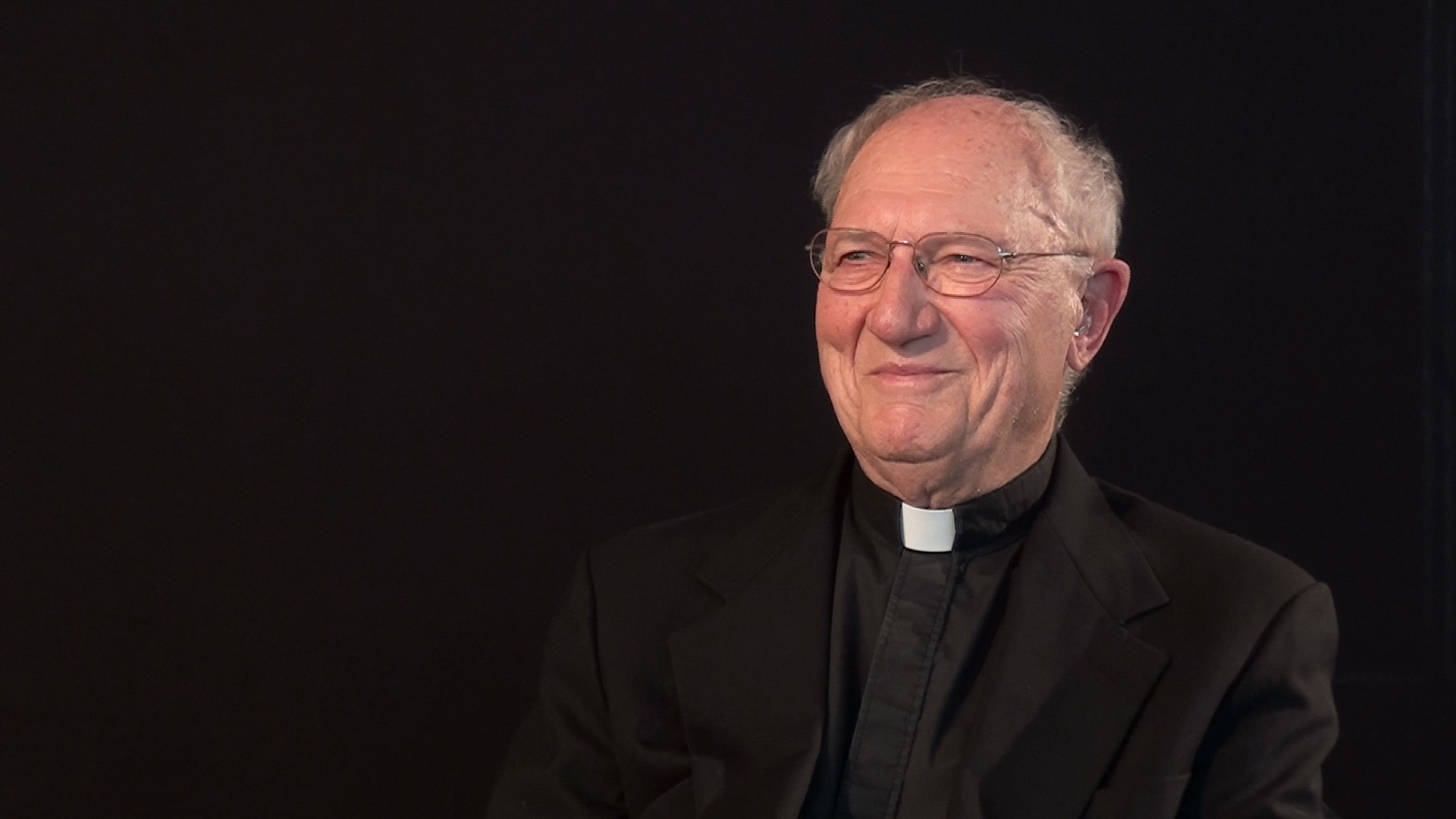
Fr. Al Krzyzopolski, retired priest of the diocese. Ordained 1950
As a measure of proof that priestly ministry, despite radical changes in culture and the world, remains largely the same through the decades, consider the following quotes from two priests of the Diocese of Sioux Falls:
“We are all seeking the love of Jesus and it is only the Church that will fulfill this deep down desire that we all have.”
“We are people of the Resurrection and filled with hope and must dream of an ever more promising future.”
The first quote is from Fr. Barry Reuwsaat, ordained a priest in 2016 and serving as parochial vicar at Sacred Heart Parish, Aberdeen.
The second is from Fr. Al Krzyzopolski, ordained a priest in 1950, long-time pastor around the diocese and still active providing weekend coverage and other ministry at age 93.
That’s not to say that ministry needs haven’t changed; clearly approaches to successfully sharing the Good News have had to adapt in some ways, especially given the changes in family, technology, and globalization.
We will hear from a sampling of diocesan priests of various ages and ministry experiences. Of course priests aren’t the only ones in ministry; given our baptism we are all called to be the hands and feet of Christ as we are able. But this story will highlight priestly ministry as experienced by those in this story.
Fr. Krzyzopolski notes that one of the things that has changed is how best to reach and teach people.
“When teaching high school students and adults in RCIA classes back in the 1950s and 60s as a young priest I noted that one could begin with the catechism. People accepted the authority of the Church as the primary source of religious truth,” he said.
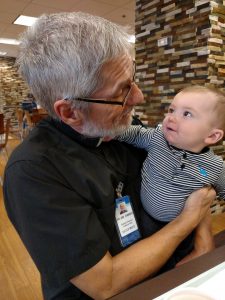
Ordained 1976
The general societal unrest of the 1960s and 70s included rebellion against law and order and authority across the board. “One had to find a more effective way to present the religious truth,” said Fr. Krzyzopolski.
“It turns out to be the presentation of knowledge with love – the way of Jesus – starting with the life of the Redeemer and what he said … that leads people to form a close relationship and friendship…and therefore more readily accepting His teaching,” he said.
It might be surprising that most priests seem to find that people’s needs and desires are similar, regardless of the age of the person or even of the classic age groups, like baby boomers or millennials.
“We all have the same elementary desires: to be loved, to search for truth, for justice, for forgiveness,” said Father Jeff Norfolk, chaplain at St. Thomas More Newman Center, Vermillion and a priest since 2009.
“No matter what group I am called to minister to our human nature and human desires are always the starting point for me. We are all poor and in need before God,” he said.
Fr. Jim Zimmer, ordained in 1976 and a long-time hospital chaplain said starting with the idea that there may be differences because of age groups does not work well.
“But if I start with basic human desire – the longing to be accepted and recognized then it seems to take care of itself,” he said.
Fr. Zimmer said an example that often happens in a hospital room is finding everyone gathered with the patient using their smart phones.
Upon entering he said “I try to acknowledge all in the room and it is amazing how a simple greeting will warm people up – just recognizing the person. They quickly get beyond being absorbed in the device and come alive.”
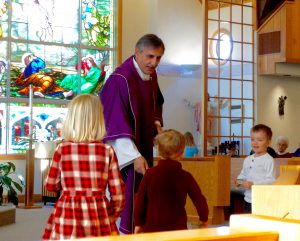
Ordained 1984
Making adjustments in how to consider people has been helpful in the ministry of Fr. David Roehrich. “I try to take the Incarnation seriously – that reality that Jesus said to us ‘I am with you through the ages,’” he said.
Instead of starting from a place of telling people about what they are doing wrong, he seeks to explore the desires of their heart and that often opens people to experience God in a whole different way.
Some years ago he worked with a family who had baptized a child, then disappeared for several years until another child was born. “Instead of making an issue of their absence, I asked them where they experienced God’s awe and wonder – and of course it was in their children.
“Somehow that touched their hearts and they started coming to church regularly,” said Fr. Roehrich, a priest since 1984, who now pastors at parishes in Beresford, Wakonda and Centerville. He also often helps out at nearby Broom Tree Retreat and Conference Center.
“By seeing them not as ‘problem people’ but as people needing to be invited to meet Christ, the connection was made,” he said.
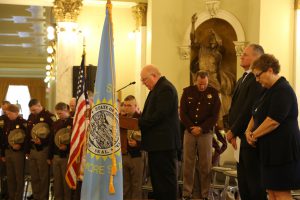
Ordained 1982
Photo courtesy of South Dakota Department of Public Safety/Highway Patrol
Fr. Joe Holzhauser, pastor at Ss. Peter and Paul in Pierre notes that one of the most significant changes in ministry is that the Church is now most often viewed as counter-cultural.
“Societal norms are now often not the same as what the Church believes – about life, family, weekly worship – the priorities are vastly different and almost opposed to the Church,” he said.
“We have to be honest and ask people to make a choice and commitment – are you of the world or in the world? If I choose to follow the Gospel I may be seen as different than others.
“The asking has to be done in an inviting way, not alienating or becoming self-righteous, but to join in the mystery,” said Fr. Hozhauser, ordained in 1982 and who also spent many years as a military chaplain.
“The polarization which today affects nations, families, parishes, life in the church means we want to make great distinctions, but we can’t have it in the church; we all belong to Jesus Christ,” he said.
Dealing with diversity was common in his service as a military chaplain, especially during deployments in countries where Christianity was not the norm.
“We had to learn through cultural indoctrination what was acceptable. Beyond that soldiers have individual rights and we found the need for adapting and working through the diverse approaches.
“But the bottom line was: always bringing soldiers to God and God to soldiers,” Fr. Holzhauser said.
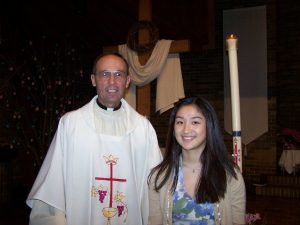
Ordained 1972
Fr. Rodney Farke grew up in the days before the Second Vatican Council, was in seminary through the Council and became a priest in 1972.
“I hope people of all ages can have an openness to the diversity of the age groups in our church, and will be able to learn from the particular preferences in style of worship and prayer that the various age groups have,” he said.
“I’m grateful for having had the opportunity to experience the pre-Vatican church in my childhood, the excitement of Vatican II, and the various new directions the church has taken, as it continues to digest and understand the teachings of Vatican II.
“The ‘swinging of the pendulum’ in terms of style of worship, religious education, and church management, can be unnerving at times, but the Holy Spirit continues to guide the church, as we move through time,” said Fr. Farke, who is now retired.
Again, the long ordained and the recently ordained have similar perspectives on where people are today in their faith journey and their understanding of their role in the Church.
“I see a new recognition by the people …they realize that they are co-responsible and must serve as members of councils…they wish to add their gifts and talents to forming policies and helping guide the affairs of their parish,” said Fr. Krzyzopolski.
“There has been a new interest of the people in the study of the Scriptures, which seems to fascinate them as they experience the Holy Spirit inspiring them, seeing their lives reflected in the stories and words found there,” he said.
“In the 30 years that I have had the privilege of leading Bible study groups they have come, filling the rooms in the parish and at Broom Tree Retreat Center,” he said.
“They are truly hungry for the Word of God.”
Said Fr. Farke, “As a parish priest, I appreciated the more personal faith in Jesus that many people had in the 70’s and 80’s, though that generation may have missed some of the traditional knowledge of the faith that I grew up with.
“The new interest in Scripture meant that those in that generation became more informed about the Bible, and bible studies were very popular, as they continue to be,” he said.
“The renewal movements, such as Cursillo, the Charismatic Renewal, Koinonia, TEC, Search, and other similar movements, gave to the participants a more personal relationship with Christ, as well as an encouragement to evangelize, to share their faith with others.
“This was very exciting to me as a pastor, as these people were eager to take active roles in the parish and to share the task of evangelization with me as priest,” said Fr. Farke.
The more newly ordained Fr. Reuwsaat puts it like this:
“When I have focused on why the faith makes sense and how it improves our lives during the homily, all age groups tend to take a likening to it.
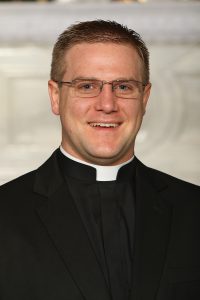
Ordained 2016
“Maybe I’m generalizing this but the older generation of priests grew up with everyone going to Church as a family. This was an obligation of the family. This no longer exists. This moves the focus from “should” to “why” one would practice the faith,” he said.
“The thirst for a relationship with Jesus Christ and living an authentic life acceptable to God” is common to all people, all ages, said Fr. Reuwsaat.
“People deep down want to know that they are pleasing to God.”
Adds Fr. Norfolk, “The best example I have of this is World Youth Day. Both in Sydney and Krakow, young people, priests, and religious from all over the world gathered around Pope Benedict, an 80 year old man, when we saw him in 2008 and Pope Francis, 80 years old, when we saw him a year ago in Krakow.
“What draws people of all ages to an 80 year old man? The presence of Christ,” he said.
“He is living the presence of Christ. We are drawn to Christ in people no matter how old they are. Galatians 2:20 says, ‘yet I live, no longer I, but Christ lives in me; insofar as I now live in the flesh, I live by faith in the Son of God who has loved me and given himself up for me.’ Male and female, young or old, all of us are looking for Christ. We find Him in the ordinary circumstances of our daily lives, often in surprising ways. I don’t make Him happen. He shows up and surprises me,” Fr. Norfolk said.
Fr. Roehrich said the eight nursing homes within his parishes mean frequent Masses and ministry there. “I’ve come to love the ministry. Christ is there. I try to help them remember they have value – they are more than a broken body. Only Christ can help me stand with them in the way of hope.”
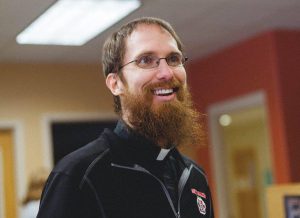
Ordained 2009
Fr. Zimmer echoes this belief from his experiences with the sick and sometimes dying in his hospital chaplain work.
“The starting point is knowing Christ. Then you can get to the questions that might need to be answered, rather than giving answers to questions that haven’t been asked,” he said.
Most every priest notes the importance of family life to faith life, and that challenges to one often mean challenges for the other.
“As the decades after Vatican II went on, the immediate post-council excitement decreased, while family life became more strained with the increased ‘busyness’ most people and families were experiencing,” said Fr. Farke. “Presenting the teachings of the church to the busy generation was becoming more challenging, and getting people to participate in Mass on a regular basis also became more of a challenge.”
Despite some challenges with what Fr. Holzhasuer called “definitions – what is marriage? Family?” and “a growth in dysfunctional families that impacts how we do ministry,” he said the biggest thing to remember is that “shepherds need to know the sheep. They are not all the same, and that’s true across generations, all require a shepherd.
“We all resist correction even though we all need it,” said Fr. Holzhauser.
He said he has experienced deep connections through the years, both in his parish and military chaplain ministry.
“Over the years in the military there is an automatic cohesion that happens. We see each other as brothers and sisters and there is a bond that something like a deployment only makes tighter.
“It happens in parishes too, maybe through a marriage preparation or working with a family preparing for a funeral. Tough deaths seem to bond the pastor with the people in a special way,” he said.
“It is because of the unknown of death. But with faith, trust and hope, and most especially, love, it gets people through.”
Fr. Zimmer, based on his experience in the hospital, still sees strength in families.
“For sure I notice it in time of crisis. I often see a togetherness and it makes one grow in appreciation of the strength of families. The staff also notices and takes family into account,” he said. “I’m often heartened by it.”
Crisis moments also can provide moments for reconciliation in families. “They often need and desire for it to happen, that moment of healing,” he said.


